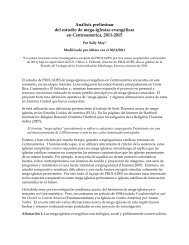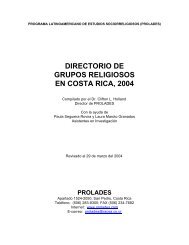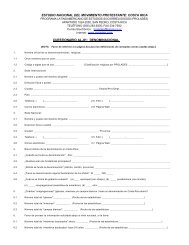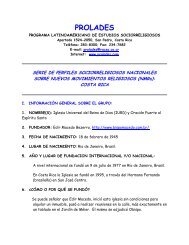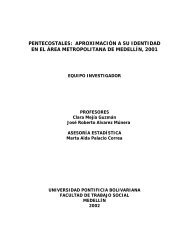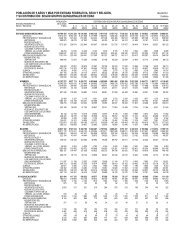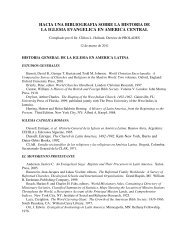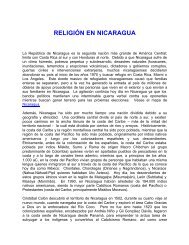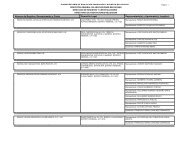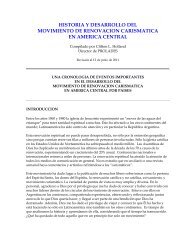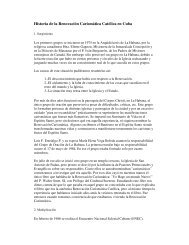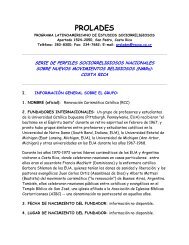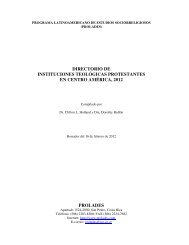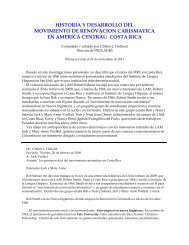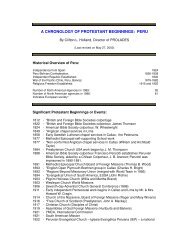Toward a Classification System of Religious Groups ... - Prolades.com
Toward a Classification System of Religious Groups ... - Prolades.com
Toward a Classification System of Religious Groups ... - Prolades.com
Create successful ePaper yourself
Turn your PDF publications into a flip-book with our unique Google optimized e-Paper software.
Any religious group that does not share these convictions cannot be<br />
considered part <strong>of</strong> the Protestant movement, which is formed by church<br />
bodies, whether denominations or independent congregations, that are<br />
an integral part <strong>of</strong> the Universal Body <strong>of</strong> Christ, <strong>com</strong>posed <strong>of</strong> “all true<br />
believers in the Lord Jesus Christ;” conversely, no single church body<br />
(denomination, independent church or any other organization) represents<br />
the totality <strong>of</strong> the Church <strong>of</strong> Jesus Christ on planet Earth; the concept <strong>of</strong><br />
"denominationalism" means that each church body constituted <strong>of</strong> “bornagain<br />
believers” forms part <strong>of</strong> the invisible Universal Body <strong>of</strong> Christ, and<br />
have received the gift <strong>of</strong> the Holy Spirit as a guarantee <strong>of</strong> their spiritual<br />
heritage as members <strong>of</strong> the Family <strong>of</strong> God; those who seek to obey the<br />
Lord Jesus Christ as His disciples meet regularly in congregations <strong>of</strong><br />
believers to share their <strong>com</strong>mon faith, study the Holy Scripures, share<br />
the Lord’s Supper, worship together, and support and encourage one<br />
another in the endeavors <strong>of</strong> the Christian life, in obedience to the Great<br />
Commandent and in fulfilment <strong>of</strong> the Great Commission.<br />
The various congregations and denominations <strong>of</strong> the Protestant movement<br />
are related to each other as a “family <strong>of</strong> believers,” but may have<br />
different forms <strong>of</strong> church government: the basic types are episcopal,<br />
presbyterian and congregational; individual congregations <strong>of</strong> believers<br />
may be affiliated with other congregations in associations <strong>of</strong> churches<br />
(typically called "denominations") whether locally, regionally, nationally<br />
or internationally; each <strong>of</strong> these denominational organizations are selfgoverning<br />
and usually have a legal status before their respective civil<br />
governments; the various congregations and denominations may have<br />
some historical, doctrinal and life-style affinity so as to be grouped<br />
into Families <strong>of</strong> Denominations and Major Traditions within the<br />
Protestant movement such as those listed below in this annotated<br />
outline, which is based largely on Dr. J. Melton Gordon’s Encyclopedia<br />
<strong>of</strong> American Religion (Detroit, MI: Gale Research, 1996, Fifth Edition);<br />
see the following links for basic definitions:<br />
http://religiousmovements.lib.virginia.edu/pr<strong>of</strong>iles/listmelton.htm<br />
http://www.kentaurus.<strong>com</strong>/domine/protestant.HTM<br />
http://bpc.org/reading_room/books/wylie/protestantism.html<br />
The Protestant Reformation had many causes and players, but it<br />
represents a major shift in the history <strong>of</strong> the Christian Church, with the<br />
emergence <strong>of</strong> a new worldview (known as “the spirit <strong>of</strong> the Protestant<br />
Reformation”—the freedom <strong>of</strong> the individual to question authority and<br />
make his own choices, as later typified in the American Bill <strong>of</strong> Rights)<br />
that produced many radical changes in Europe and North America, and<br />
the repercussions <strong>of</strong> this Reformation have been felt around the world.<br />
For more information, check out the following links:<br />
http://www.newgenevacenter.org/west/reformation.htm<br />
http://www.educ.msu.edu/homepages/laurence/reformation/index.htm<br />
http://www.markers.<strong>com</strong>/ink/classic.htm<br />
http://history.hanover.edu/early/prot.html<br />
31



